-
 Bitcoin
Bitcoin $84,650.6039
1.12% -
 Ethereum
Ethereum $1,598.2028
1.34% -
 Tether USDt
Tether USDt $0.9997
-0.03% -
 XRP
XRP $2.1078
1.77% -
 BNB
BNB $587.8170
1.08% -
 Solana
Solana $133.8641
6.87% -
 USDC
USDC $1.0002
0.01% -
 TRON
TRON $0.2474
-2.42% -
 Dogecoin
Dogecoin $0.1566
2.47% -
 Cardano
Cardano $0.6212
2.83% -
 UNUS SED LEO
UNUS SED LEO $9.4611
0.96% -
 Chainlink
Chainlink $12.5054
3.10% -
 Avalanche
Avalanche $19.3976
3.15% -
 Toncoin
Toncoin $2.9605
3.61% -
 Stellar
Stellar $0.2389
1.75% -
 Shiba Inu
Shiba Inu $0.0...01186
1.92% -
 Sui
Sui $2.1056
2.04% -
 Hedera
Hedera $0.1604
2.35% -
 Bitcoin Cash
Bitcoin Cash $332.3429
4.62% -
 Polkadot
Polkadot $3.6316
3.71% -
 Litecoin
Litecoin $75.2379
1.57% -
 Hyperliquid
Hyperliquid $16.7140
10.27% -
 Dai
Dai $0.9999
-0.01% -
 Bitget Token
Bitget Token $4.3636
0.77% -
 Ethena USDe
Ethena USDe $0.9991
-0.02% -
 Pi
Pi $0.6066
0.02% -
 Monero
Monero $217.4747
0.05% -
 Uniswap
Uniswap $5.2126
1.45% -
 Pepe
Pepe $0.0...07297
2.27% -
 OKB
OKB $50.9568
-1.99%
How to choose a mining pool for graphics card mining?
Choose a mining pool prioritizing high hashrate, low fees, reliable infrastructure, and transparent reporting; consider payment system, community support, and algorithm compatibility for optimal cryptocurrency mining profitability.
Mar 19, 2025 at 08:57 pm
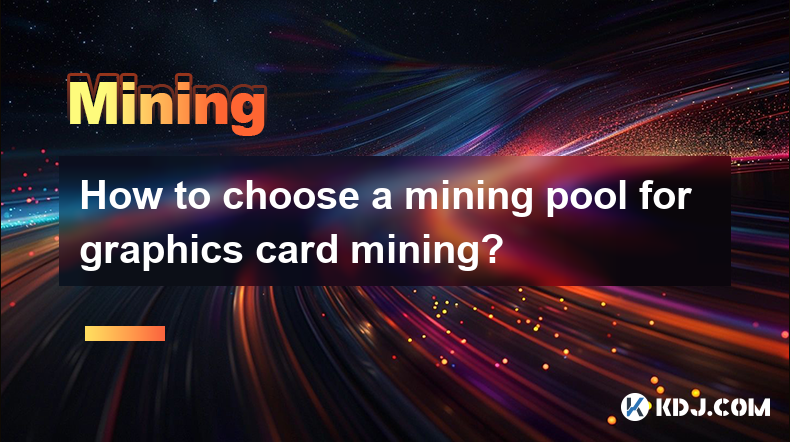
Key Points:
- Hashrate and Fees: Prioritize pools with high hashrate and reasonable fees to maximize profitability. Lower fees mean more of your mining rewards go directly to you. High hashrate increases your chances of finding blocks faster.
- Payment System and Frequency: Understand the pool's payment system (PPS, PPLNS, etc.) and payment frequency. Each system has different risk and reward profiles. Regular payouts are preferable for consistent income.
- Pool's Server Infrastructure and Reliability: A stable and reliable pool with minimal downtime is crucial for uninterrupted mining. Look for pools with a strong reputation and robust infrastructure.
- Pool Software and Transparency: Choose pools with user-friendly software and transparent reporting. Easy access to your mining statistics and payout information is essential.
- Community and Support: A responsive and helpful community can be invaluable when troubleshooting issues. Look for pools with active forums or support channels.
- Coin Selection and Algorithm Support: Ensure the pool supports the specific cryptocurrency and mining algorithm you intend to use with your graphics card.
How to Choose a Mining Pool for Graphics Card Mining?
Choosing the right mining pool is crucial for maximizing your profitability and minimizing frustration when mining cryptocurrencies with your graphics cards. A poorly chosen pool can lead to wasted electricity and reduced earnings. This guide helps you navigate the process.
Understanding Hashrate and Fees
The pool's hashrate—the total computing power contributed by all miners—is a key factor. Higher hashrate means more frequent block discoveries, leading to more frequent payouts. However, you also need to consider the pool's fees. Fees are typically a percentage of your mining rewards. Strive for a balance between high hashrate and low fees to maximize your net profit. Compare the fees of several pools before making a decision.
Payment Systems and Their Implications
Different pools utilize various payment systems. Pay-Per-Share (PPS) offers consistent payouts regardless of whether the pool finds a block. Pay-Per-Last-N-Shares (PPLNS) pays based on your contribution to blocks found within a specific window. Proportional (PROP) distributes rewards proportionally to your contribution. Each system has its own risk-reward profile. Consider your risk tolerance when making your choice. Regular payout frequency, such as daily or hourly, is generally preferred for stable income.
Pool Server Infrastructure and Reliability
A reliable pool with minimal downtime is paramount. Downtime means lost mining opportunities and reduced earnings. Look for pools with a proven track record of stability and strong server infrastructure. Read reviews and check the pool's uptime statistics before committing your mining power. A well-maintained pool will minimize interruptions to your mining operations.
Pool Software and Transparency
The pool's software should be user-friendly and provide clear, accurate statistics about your mining performance. Transparency is vital; you should have easy access to your mining statistics, payout history, and the pool's overall performance. Look for pools with dashboards that offer comprehensive information in an easily digestible format. Opaque pools should be avoided.
Community and Support
A strong and active community can be a significant asset. If you encounter problems, a helpful community can provide valuable support and assistance. Look for pools with active forums, Discord servers, or other communication channels where you can connect with other miners and seek help from the pool's operators. A responsive support team can significantly improve your mining experience.
Coin Selection and Algorithm Support
Ensure the pool supports the specific cryptocurrency and mining algorithm compatible with your graphics cards. Not all pools support all coins or algorithms. Verify compatibility before joining a pool to avoid wasting your resources. Choosing a pool that supports your target cryptocurrency is crucial for successful mining.
Common Questions and Answers:
Q: What is the best mining pool?
A: There's no single "best" pool. The ideal pool depends on your specific needs and priorities (hashrate, fees, payment system, etc.). Research multiple pools to find the one that best suits your circumstances.
Q: How do I choose between PPS, PPLNS, and PROP?
A: PPS offers consistent payouts but usually charges higher fees. PPLNS is riskier but potentially more rewarding if the pool finds many blocks. PROP offers a balance between the two. Your choice depends on your risk tolerance and preferred payout stability.
Q: What should I do if my chosen pool goes offline?
A: Having a backup pool is recommended. Switching to a backup pool minimizes downtime and potential loss of earnings. Regularly monitor your chosen pool's status and have alternative options readily available.
Q: How often should I check my mining pool statistics?
A: Regularly checking your statistics (daily or even hourly) allows you to monitor your performance and identify potential problems early on. This proactive approach helps in optimizing your mining operation and ensuring consistent payouts.
Q: Are there any free mining pools?
A: While some pools might advertise themselves as "free," they typically generate revenue through fees. It's essential to carefully review the fee structure of any pool before joining, regardless of whether it advertises itself as free or not. Hidden fees can significantly reduce your overall profitability.
Disclaimer:info@kdj.com
The information provided is not trading advice. kdj.com does not assume any responsibility for any investments made based on the information provided in this article. Cryptocurrencies are highly volatile and it is highly recommended that you invest with caution after thorough research!
If you believe that the content used on this website infringes your copyright, please contact us immediately (info@kdj.com) and we will delete it promptly.
- SUI holds firm at $2 as wedge breakout nears
- 2025-04-17 21:15:12
- Dawgz AI ($DAGZ) Shows Strong Presale Momentum, Targeting Breakout Potential After Launch
- 2025-04-17 21:15:12
- Amazon Web Services (AWS) Outage Freezes Cryptocurrency Withdrawals on Binance, KuCoin, and MEXC
- 2025-04-17 21:10:13
- Introducing Initia (INIT) to Binance Launchpool
- 2025-04-17 21:10:13
- How Much Could 2,500 ONDO Tokens Make You by the End of 2025?
- 2025-04-17 21:05:14
- Bitcoin (BTC) Infrastructure Developer Lombard Finance Launches One-Click Staking SDK
- 2025-04-17 21:05:14
Related knowledge

How to deal with abnormal noise during mining machine operation?
Apr 17,2025 at 01:35am
Mining machines are essential tools for cryptocurrency miners, but they can sometimes produce abnormal noises that may indicate underlying issues. Understanding how to identify and address these noises is crucial for maintaining the efficiency and longevity of your mining equipment. This article will guide you through the process of dealing with abnorma...

How to maintain anonymity when mining?
Apr 17,2025 at 06:01pm
Maintaining anonymity when mining cryptocurrencies is crucial for many miners who wish to protect their privacy and security. This article will guide you through various strategies and tools that can help you achieve a high level of anonymity while engaging in mining activities. Understanding the Importance of Anonymity in MiningAnonymity in the context...
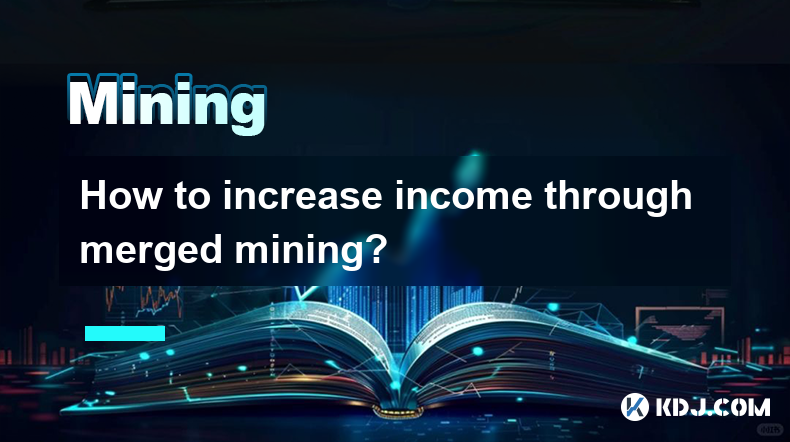
How to increase income through merged mining?
Apr 17,2025 at 09:22am
Merged mining is a technique that allows miners to mine more than one cryptocurrency at the same time, using the same computational resources. This method can significantly increase income for miners by maximizing the efficiency of their hardware and reducing the overall cost per hash. In this article, we will explore the concept of merged mining, its b...
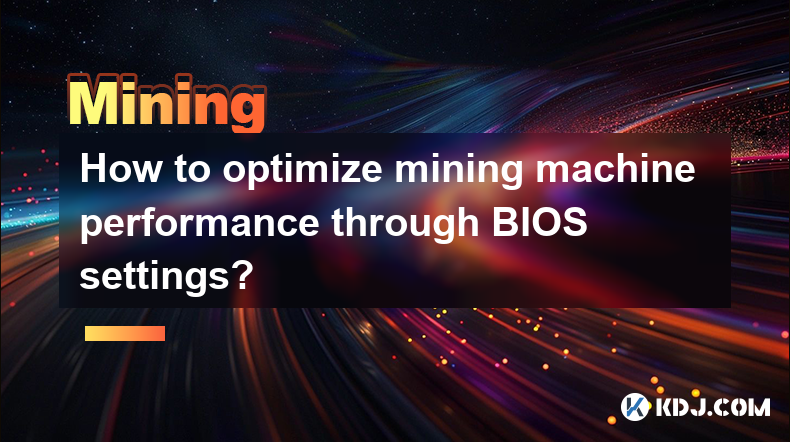
How to optimize mining machine performance through BIOS settings?
Apr 17,2025 at 08:07pm
Optimizing the performance of a mining machine through BIOS settings can significantly enhance its efficiency and profitability. The BIOS, or Basic Input/Output System, is the firmware that controls the basic functions of your computer and provides runtime services for operating systems and programs. By tweaking certain settings within the BIOS, miners ...
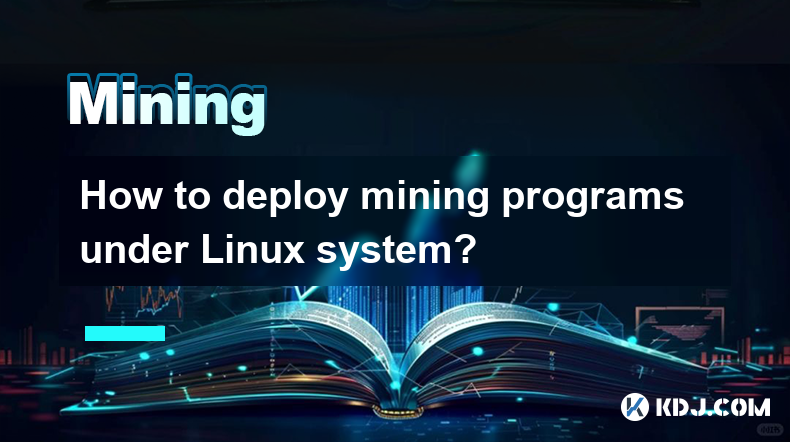
How to deploy mining programs under Linux system?
Apr 17,2025 at 09:57am
Deploying mining programs under a Linux system can be a rewarding endeavor for those interested in cryptocurrency mining. This process involves several steps, from setting up the environment to running the mining software. In this article, we will guide you through the detailed process of deploying mining programs on a Linux system, ensuring you have al...
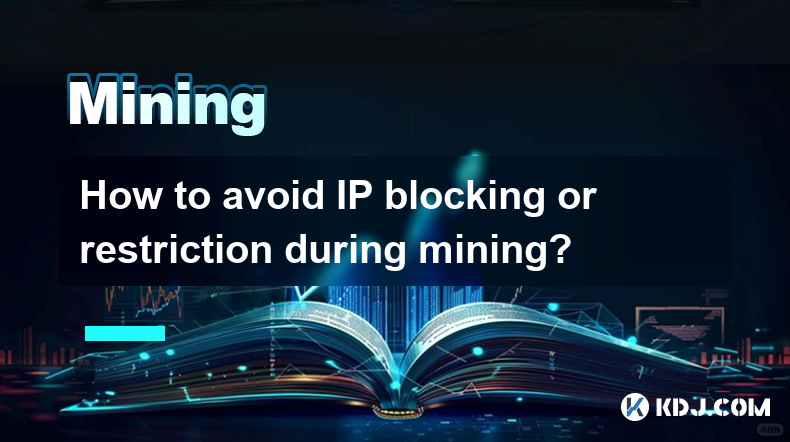
How to avoid IP blocking or restriction during mining?
Apr 16,2025 at 09:36pm
Mining cryptocurrency is an exciting venture that can yield significant rewards, but it can also come with its own set of challenges. One of these challenges is IP blocking or restriction, which can hinder your mining activities. In this article, we will explore various strategies to avoid IP blocking or restriction during mining, ensuring that you can ...

How to deal with abnormal noise during mining machine operation?
Apr 17,2025 at 01:35am
Mining machines are essential tools for cryptocurrency miners, but they can sometimes produce abnormal noises that may indicate underlying issues. Understanding how to identify and address these noises is crucial for maintaining the efficiency and longevity of your mining equipment. This article will guide you through the process of dealing with abnorma...

How to maintain anonymity when mining?
Apr 17,2025 at 06:01pm
Maintaining anonymity when mining cryptocurrencies is crucial for many miners who wish to protect their privacy and security. This article will guide you through various strategies and tools that can help you achieve a high level of anonymity while engaging in mining activities. Understanding the Importance of Anonymity in MiningAnonymity in the context...

How to increase income through merged mining?
Apr 17,2025 at 09:22am
Merged mining is a technique that allows miners to mine more than one cryptocurrency at the same time, using the same computational resources. This method can significantly increase income for miners by maximizing the efficiency of their hardware and reducing the overall cost per hash. In this article, we will explore the concept of merged mining, its b...

How to optimize mining machine performance through BIOS settings?
Apr 17,2025 at 08:07pm
Optimizing the performance of a mining machine through BIOS settings can significantly enhance its efficiency and profitability. The BIOS, or Basic Input/Output System, is the firmware that controls the basic functions of your computer and provides runtime services for operating systems and programs. By tweaking certain settings within the BIOS, miners ...

How to deploy mining programs under Linux system?
Apr 17,2025 at 09:57am
Deploying mining programs under a Linux system can be a rewarding endeavor for those interested in cryptocurrency mining. This process involves several steps, from setting up the environment to running the mining software. In this article, we will guide you through the detailed process of deploying mining programs on a Linux system, ensuring you have al...

How to avoid IP blocking or restriction during mining?
Apr 16,2025 at 09:36pm
Mining cryptocurrency is an exciting venture that can yield significant rewards, but it can also come with its own set of challenges. One of these challenges is IP blocking or restriction, which can hinder your mining activities. In this article, we will explore various strategies to avoid IP blocking or restriction during mining, ensuring that you can ...
See all articles























































































